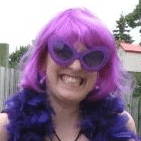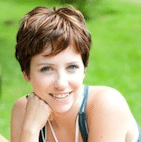
Jennifer C
Hometown: St. Catharines/Ottawa, ON
What was your diagnosis? Hodgkin’s Lymphoma
What school did/do you attend? University of Western Ontario, Brock University, University of Ottawa
What are your career goal? To become a professor and researcher in the field of education.
What is your occupation? Professional student!
Your Cancer experience:
How did you find out you were sick? What led to your diagnosis?
I didn’t have any strong indicators that made me worried about my health. In hindsight, there were a few things that were not “normal” for me. I was having night sweats in December when I am usually cold at night. I had naps when I came home from work, and felt overly tired. At the end of January, I started getting severe pain in my chest. I thought I had heartburn! After a night of pain that wouldn’t go away, I went to the emergency room where I underwent a slew of tests to be diagnosed with cancer.
What year was it? What was your age at the time?
February 2011, I was 30.
In which hospitals were you treated?
Kingston General/St. Catharines General
At what level of education were you at diagnosis?
Masters of Education
What were your first thoughts when diagnosed?
I just remember going blank. The doctor kept talking to me, but I couldn’t listen past the word “cancer.” I thought cancer only affected older people. My grandmother had ovarian cancer and was lucky to survive nine years with the disease. When I was told that it was cancer, I had to have a bone marrow extraction immediately after. I was so upset and still processing my diagnosis. I felt like I had been given a death sentence. I thought that I wouldn’t be able to get married, have children, and grow old.
How did your family react?
My parents were incredibly distraught. I had just started this new life in Kingston, and everything came to a complete halt. My family has been incredibly supportive and has been my rock throughout this process.
How did your friends react? Were you treated differently, or did things remain the same?
My friends have been the best thing to come out of this whole situation. People that I had not talked to in ages rallied together and sent me so much support. My two best friends raised money and shaved their heads in support. I have been overwhelmed by their unconditional love. People have truly come out of the woodwork to send love and encouragement.
What did your treatment consist of?
I underwent 12 rounds of chemo. Regular ABVD treatment. I had neupogen injections to keep up my white blood cell count. I also had a blood clot because of the picc line and had injections of lovenox. I am currently waiting to see if I need radiation.
In the beginning I thought “let’s beat this thing!” but as time went along, I became pretty frustrated. I was exhausted, sore, sick, etc. and came close to not wanting to continue, but knew I had to keep going. I had to have injections of neupogen to keep my white blood cell count up, but the side effects made my whole body ache. I caught pneumonia about halfway through treatment and was hospitalized for nine days. I lost about 12 pounds and had to use an oxygen mask. I had to have one picc line removed because it became infected, and had an allergic reaction to the cleaning liquids they were using on the area. I also got a blood clot in my arm because of the picc line. I still receive daily lovenox injections to fend away the clot. About three days after chemo, I suffered from esophigitus pains which were quite incapacitating. It was the most challenging time of my life. It has changed how I view life both in a positive and negative way. I still fear death and reoccurrence of the disease, but I am enjoying each day as they come.
What is your current medical status?
I will have to have further tests (X-ray, PET scan, CT scan) in December to see if the activity in my chest is normal or if it indicates the presence of cancer.
How is life different for you now post diagnosis?
It has changed many things in my life. I appreciate my friends and family more than I ever thought possible. I have lost some of my innocence about life lasting forever. I know my time is precious and love all the little things in my life. I enjoy standing in the rain, eating good food, and laughing with my friends. I have started my PhD. Some days are better than others. I am learning my limitations and am trying to deal with them.
What was the toughest part of your challenge?
In the beginning, it was losing my freedom. I had to move back home for treatment and give up my job and my apartment. The next challenge was getting through chemo treatment. I had chemo every other week, so I would begin to feel “good” just before going into another round of treatment. It may sound vain, but losing my hair has also been difficult. I felt very unattractive with bruises from the lovenox injections, the loss of hair, and the chemo burn marks on my skin. I no longer felt like a woman, but a cancer patient.
What was the best lesson you took away from your challenge?
I think it is the love of my friends and family. They have been an incredible source of support. They have all become so important to me. Although I sometimes felt like a burden, no one ever complained and helped me through this more than I ever thought was humanly possible.
What really motivated you to keep going while you were sick?
Knowing that I had to survive, that I could be cured. I know there are more things I want to do with my life. I found out about two weeks after I was diagnosed that I was accepted in the PhD program for this September which was been something I am looking forward to. We also had a “purple party” where we thanked all those who have supported me throughout this journey.
What are your thoughts and feelings about your illness now?
Going through treatment, I was just getting through. Now that I am done, I am ready to talk about it and meet others going through the same process. Cancer has touched everyone, and everyone has a story about someone they know who has had cancer. I am looking forward to connecting with people who have had cancer, as they are the ones who can empathize.
What are some (if there are any you know of) preventative measures that people can take to lower their risk of having an experience like yours?
As far as I know there are none. Lymphoma is a genetic mutation that they think may come from having mono, but there are many people who have had mono and don’t get lymphoma. I have become focused on eating healthy, organic, and being natural in my choices.
Did you attend any support groups during your challenge?
I went to the Look Good Feel Better program which offers free cosmetics and consultations for women with cancer. The Ottawa hospital offers courses for nutrition, energy, and counseling. The local cancer centre also offers various programs for cancer patients.
It is a great program. I was the youngest person there. Even though it was really nice to discuss wigs and make up, I felt young and couldn’t relate to the concerns of the other women. The various programs have been quite good with lots of helpful tips.
How are you connected with Young Adult Cancer Canada?
I found it online while searching for blogs.










